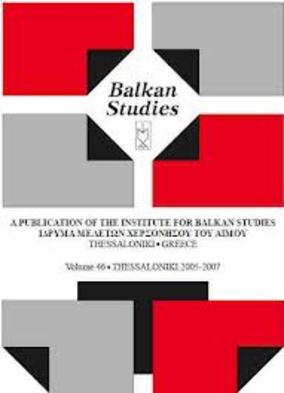Trikeri : The pirate regime of Thessaly and Magnesia:Collective impasses and personal dilemmas in the context of autonomy and dependence
Part of : Balkan studies : biannual publication of the Institute for Balkan Studies ; Vol.31, No.1, 1990, pages 6-46
Issue:
Pages:
6-46
Section Title:
Articles
Author:
Abstract:
Communalism was a form of collective life which, reproduced and adjustedto the historical circumstances prevailing at any one place or time, ralliedand supported the Greek people during their period of subjugation tothe Turks. It also enabled them to establish a pluralistic and representativeparastate, which paved the way for the War of Independence of 1821 andplayed a crucial part in the setting up of the modern Greek state.In his study “Κοινοτικός βίος εις την Θετταλομαγνησίαν επί Τουρκοκρατίας”(1967), the writer described the federal system in which Pelion’smountain communities were organised during the last three hundred yearsof slavery. In another work, “Παραδοσιακοί θεσμοί σε δοκιμασία: Η περίπτωσητης Θεσσαλίας” (1988), he analysed the situation which developed inthe lowlands of Thessaly after its annexation to Greece. The gap arising fromthe lack of any special reference to the sea, the liquid element surroundingThessaly and Magnesia, is now filled by the present article, “Trikeri: ThePirate Regime of Thessaly and Magnesia: Collective Impasses and PersonalDilemmas in the Context of Autonomy and Dependence”. It examines, onthe basis of unpublished archival material, this important maritime centre’sstruggle to maintain its autonomy in the face of the external dangers and internalfrictions provoked by its administrative, ecclesiastical, and economicisolation from the surrounding area.The writer’s intention is that historical research should make a creativecontribution to our approach to the impasses facing the institution of localself-administration and decentralisation in our own time·
Subject:
Subject (LC):
Keywords:
Θεσσαλία και Μαγνησία επί Τουρκοκρατίας
Notes:
This study evaluates the known archive material and is based to a considerableextent on unpublished sources. Consequently, in addition to published and unpublisheddiagnostic sources, reference is also made to any works which materially assist an understandingof the subject. Reference to the toponym Trikeri or repetition of well-known viewsis not considered sufficient reason for weighing the text down with bibliographical referencesof only indirect usefulness




